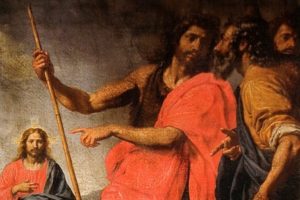The Bible’s Answer
St John the Evangelist wrote at the beginning of his Gospel, “No one has ever seen God; the only Son, who is in the bosom of the Father, he has made him known” (Jn 1:18, RSV; see also 1 Jn 4:12). Some people have erroneously taken this passage to mean that since Jesus was seen by people, he can’t be God. But such an understanding completely misses the point that John is making.
The main emphasis of the passage is not on the fact that no one has ever seen God, but rather, on the fact that the only Son, Jesus Christ, has made God known. The theme of God being formerly not fully known but now fully revealed in Jesus Christ is a key theme in John’s writings. Jesus said, “And the Father who sent me has himself borne witness to me. His voice you have never heard, his form you have never seen” (Jn 5:37), “Not that any one has seen the Father except him who is from God; he has seen the Father” (Jn 6:46). Then, half-way through the Gospel, we see this incredible Bible passage:
Philip said to him, “Lord, show us the Father, and we shall be satisfied.” 9 Jesus said to him, “Have I been with you so long, and yet you do not know me, Philip? He who has seen me has seen the Father; how can you say, ‘Show us the Father’? 10 Do you not believe that I am in the Father and the Father in me? The words that I say to you I do not speak on my own authority; but the Father who dwells in me does his works. (John 14:8–10)
This passage is where John’s key theme of Jesus revealing God is most fully developed. John went from saying that Jesus makes the unseen God known and that he alone has seen God—extraordinary claims in and of themselves—to saying that now one sees God by seeing Jesus. If Jesus only represented God, one would not see God by seeing him; for this to be true, he must be the very embodiment of God. John lays out this very teaching in the introduction, when teaching that Jesus, the Word who was with God, is the incarnation of God (which refutes both Modalism and Unitarianism1):
In the beginning was the Word, and the Word was with God, and the Word was God. … 14 And the Word became flesh and dwelt among us, full of grace and truth; we have beheld his glory, glory as of the only Son from the Father. (John 1:1, 14)
The image of the invisible God of the Old Testament has now become visible as the man Jesus Christ in the New Testament (Col 1:15), in whom “the whole fulness of deity dwells bodily” (Col 2:9). Though God was not fully known, Jesus, the incarnation of God, has now “made him known” (Jn 1:18) by coming down to us from Heaven (Jn 6:38), for no one can make God known in the most full, true sense, except for God himself. And Jesus himself declared that only he can reveal God fully, in his words, “no one knows the Father except the Son and any one to whom the Son chooses to reveal him” (Mat 11:27b). We come to know God on Jesus’ terms, not our own, because Jesus is God. John 1:18 teaches that Jesus is God, just as Christ’s Church has constantly taught for the past 2,000 years.
Notes
- Modalism is a heresy that Christ’s Church condemned, which teaches that the Father, Son, and Holy Spirit are not three Persons in one God, as the Trinity teaches, but rather three modes which the one person of God manifests himself in at different times. Jesus’ Baptism is a biblical text which powerfully refutes this unchristian teaching (Mat 3:16–17). Unitarianism is also a heresy that Christ’s Church condemned, which teaches that the Father alone is God, and that the Son and Holy Spirit are inferior created beings. John 1:1–3, 14, 20:28 and Hebrews 9:14 are biblical texts which also refute this heresy.
See Also







